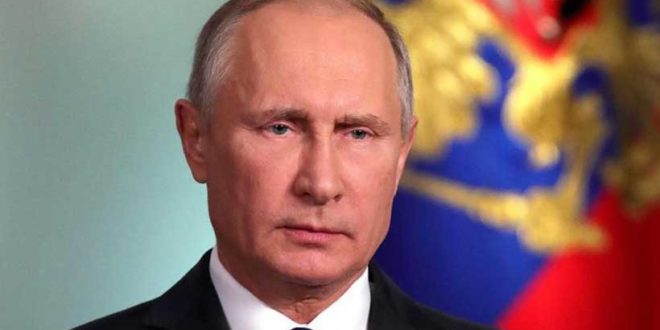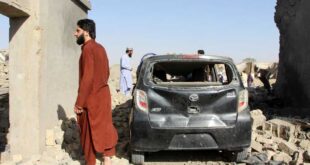Arif Bijan
Syrian troops have launched major attacks to clear Idlib province. The attacks targeted more than 30 Turkish troops, two Syrian military aircraft. About 19 Syrian soldiers, some Liwa Zainebiyoun, Fatemiyoun and Hezbollah forces were also killed In the Turkish UAV attacks. In the meantime, the reasons for this tension and Russia-Turkey-Iran competition in Syria should be examined. Although Russia and Turkey negotiated three rounds, they still failed to lead to a Cease Fire in Syria. On the one hand, Bashar al-Assad’s government is dissatisfied with Turkey’s non-compliance with the Sochi and Astana talks, and accuses Turkey of conquest Syria. On the other hand, Recep Tayyip Erdogan has said he does not intend to leave Syria and Idlib and has asked Putin not to intervene in the tensions between Syria and Turkey. Before to the conflict, Iran also sought to mediate between Russia and Turkey, but now, despite Turkish forces’ attacks, Iran’s positions on Syrian soil (Idlib and Aleppo) have become a conflicting party. The Turkish government has said it seeks to protect its forces and borders from operations known as ‘Spring Shield’, whose ultimate goal is to establish a Cease Fire in Syria. However, Turkey has said it does not intend to clash with Moscow. Moscow, by contrast, said in its interest in Syria that it would continue to support Syria in order to eliminate complete opposition forces. Another point in the conflict is the lack of US and European support for Turkey. For this reason, Turkey has opened its borders to refugees and asylum seekers to enter European countries and this shows that Turkey has taken advantage of this opportunity. To counter Turkish actions, Iran, Syria and Russia are also trying to liberate Idlib, and Turkey is seeking to prevent the fall of Idlib.
Some of Turkey’s reasons for attacking Idlib appear to be: First, the onslaught of Syrian forces to recapture Idlib has caused Syrian refugees to flow into Turkish territory. Increasing the number of refugees on Turkish soil, coupled with economic pressure in Turkey, will pose many problems for Erdogan’s government. The second is strategic reasons. Turkey has spent a great deal of money on anti-Assad forces to increase its power over the past few years in the Syrian civil war. Turkey therefore believes that it must take advantage of its geopolitical, political and military investment to play an important role in shaping the Syria’s future. Third, another reason may be the ideological aspect. Erdogan’s government is Islamist, and with the presence of Islamist forces in Idlib, he prefers to play an important role in Syrian developments and if these Islamist forces leave Syria, the only place they can go is Turkey, which raises security concerns for Turkey. Because these Islamist forces are part of al-Qaeda and ISIS forces that may carry out terrorist operations in Turkey. Therefore, these reasons make Idlib important to all parties involved. However, many believe that the ultimate goal in Syria, such as Iraq, Libya and Yemen, is to transform it into two countries. For this reason, Idlib finds a strategic position, and Turkey refuses to back down and hand over control to Syria. However, Turkey believes that if it cannot control its borders with Syria, Turkey will not allow Iran and Russia, thousands of kilometers from Idlib, to control it with the support of the Syrian government. Ankara, of course, is trying to reduce the impact of Syrian and Russian air strikes through military and diplomatic measures. To this end, the Syrian National Army (Turkish-backed Syrian Armed Forces) is equipped with US “Stinger “ portable anti-aircraft defense systems and has called on the United States to deploy Patriot air defense systems on the Syrian border. According to US President Donald Trump, the temporary deployment of US anti-aircraft systems on the Turkish-Syrian border is possible.
Meanwhile, Russia’s role as a key player in the Syrian crisis is important. Russia, backed by Syrian air forces to Turkey, has said it does not guarantee the security of Turkish flights over the Syrian sky. From Russia’s point of view, Adleb and Aleppo are part of the Syrian territory, which is why Syria is seeking to clear these areas of opposition forces and Turkey has entered Syria without permission from Syria and tells Syrian forces not to come close to it, but Russia The situation does not agree. First, Russia says Turkey’s presence is illegal, and second, any action taken there must be in accordance with Sochi and Astana agreements and with the official Syrian government. At the same time, Permanent Representative of the United States to the United Nations, Kelly Kraft, at a special Security Council meeting on the situation in Idlib, called on Russia to cease its support for the Syrian government. “We strongly urge the Russian Federation to land its military aircraft in the Syrian air immediately,” he said. In this regard, over the past few days, several Russian Black Sea Fleet military vessels have entered the Mediterranean Sea by crossing the Turkish Bosporus and Dardanelles channels to reinforce the Russian military group off the Syrian coast.
Russia is seeking a balance in the Syrian crisis and will not allow any of the forces involved to upset the balance. Although Russia seeks peace and a permanent ceasefire based on its interests on Syrian soil, it seems that Turkey is seeking a long-term presence to monitor the Kurds in Syria and Turkey, which could as a playing card against Russia-Iran-Syria. The tension between regional powers is the prospect of lasting peace after a nine-year war in Syria. The fact that Ankara does not want to engage in direct military conflict with Russia, of course, is clear in the latest phone calls made by Erdogan and Putin on the Turkish side’s initiative. Therefore, the Presidents of the two countries met on March 5, not in Ankara, but in Moscow. The two sides sought to take into account the interests of all forces in the meeting and to create a buffer zone to prevent direct conflict between Turkish and Syrian forces. Turkish Defense Minister Hulusi Akar insisted that the country did not seek confrontation with Russia, but would respond to any attacks on its troops in the region of alleviated tensions in Idlib.
Syrian troops have launched major attacks to clear Idlib province. The attacks targeted more than 30 Turkish troops, two Syrian military aircraft. About 19 Syrian soldiers, some Liwa Zainebiyoun, Fatemiyoun and Hezbollah forces were also killed In the Turkish UAV attacks. In the meantime, the reasons for this tension and Russia-Turkey-Iran competition in Syria should be examined. Although Russia and Turkey negotiated three rounds, they still failed to lead to a Cease Fire in Syria. On the one hand, Bashar al-Assad’s government is dissatisfied with Turkey’s non-compliance with the Sochi and Astana talks, and accuses Turkey of conquest Syria. On the other hand, Recep Tayyip Erdogan has said he does not intend to leave Syria and Idlib and has asked Putin not to intervene in the tensions between Syria and Turkey. Before to the conflict, Iran also sought to mediate between Russia and Turkey, but now, despite Turkish forces’ attacks, Iran’s positions on Syrian soil (Idlib and Aleppo) have become a conflicting party. The Turkish government has said it seeks to protect its forces and borders from operations known as ‘Spring Shield’, whose ultimate goal is to establish a Cease Fire in Syria. However, Turkey has said it does not intend to clash with Moscow. Moscow, by contrast, said in its interest in Syria that it would continue to support Syria in order to eliminate complete opposition forces. Another point in the conflict is the lack of US and European support for Turkey. For this reason, Turkey has opened its borders to refugees and asylum seekers to enter European countries and this shows that Turkey has taken advantage of this opportunity. To counter Turkish actions, Iran, Syria and Russia are also trying to liberate Idlib, and Turkey is seeking to prevent the fall of Idlib.
Some of Turkey’s reasons for attacking Idlib appear to be: First, the onslaught of Syrian forces to recapture Idlib has caused Syrian refugees to flow into Turkish territory. Increasing the number of refugees on Turkish soil, coupled with economic pressure in Turkey, will pose many problems for Erdogan’s government. The second is strategic reasons. Turkey has spent a great deal of money on anti-Assad forces to increase its power over the past few years in the Syrian civil war. Turkey therefore believes that it must take advantage of its geopolitical, political and military investment to play an important role in shaping the Syria’s future. Third, another reason may be the ideological aspect. Erdogan’s government is Islamist, and with the presence of Islamist forces in Idlib, he prefers to play an important role in Syrian developments and if these Islamist forces leave Syria, the only place they can go is Turkey, which raises security concerns for Turkey. Because these Islamist forces are part of al-Qaeda and ISIS forces that may carry out terrorist operations in Turkey. Therefore, these reasons make Idlib important to all parties involved. However, many believe that the ultimate goal in Syria, such as Iraq, Libya and Yemen, is to transform it into two countries. For this reason, Idlib finds a strategic position, and Turkey refuses to back down and hand over control to Syria. However, Turkey believes that if it cannot control its borders with Syria, Turkey will not allow Iran and Russia, thousands of kilometers from Idlib, to control it with the support of the Syrian government. Ankara, of course, is trying to reduce the impact of Syrian and Russian air strikes through military and diplomatic measures. To this end, the Syrian National Army (Turkish-backed Syrian Armed Forces) is equipped with US “Stinger “ portable anti-aircraft defense systems and has called on the United States to deploy Patriot air defense systems on the Syrian border. According to US President Donald Trump, the temporary deployment of US anti-aircraft systems on the Turkish-Syrian border is possible.
Meanwhile, Russia’s role as a key player in the Syrian crisis is important. Russia, backed by Syrian air forces to Turkey, has said it does not guarantee the security of Turkish flights over the Syrian sky. From Russia’s point of view, Adleb and Aleppo are part of the Syrian territory, which is why Syria is seeking to clear these areas of opposition forces and Turkey has entered Syria without permission from Syria and tells Syrian forces not to come close to it, but Russia The situation does not agree. First, Russia says Turkey’s presence is illegal, and second, any action taken there must be in accordance with Sochi and Astana agreements and with the official Syrian government. At the same time, Permanent Representative of the United States to the United Nations, Kelly Kraft, at a special Security Council meeting on the situation in Idlib, called on Russia to cease its support for the Syrian government. “We strongly urge the Russian Federation to land its military aircraft in the Syrian air immediately,” he said. In this regard, over the past few days, several Russian Black Sea Fleet military vessels have entered the Mediterranean Sea by crossing the Turkish Bosporus and Dardanelles channels to reinforce the Russian military group off the Syrian coast.
Russia is seeking a balance in the Syrian crisis and will not allow any of the forces involved to upset the balance. Although Russia seeks peace and a permanent ceasefire based on its interests on Syrian soil, it seems that Turkey is seeking a long-term presence to monitor the Kurds in Syria and Turkey, which could as a playing card against Russia-Iran-Syria. The tension between regional powers is the prospect of lasting peace after a nine-year war in Syria. The fact that Ankara does not want to engage in direct military conflict with Russia, of course, is clear in the latest phone calls made by Erdogan and Putin on the Turkish side’s initiative. Therefore, the Presidents of the two countries met on March 5, not in Ankara, but in Moscow. The two sides sought to take into account the interests of all forces in the meeting and to create a buffer zone to prevent direct conflict between Turkish and Syrian forces. Turkish Defense Minister Hulusi Akar insisted that the country did not seek confrontation with Russia, but would respond to any attacks on its troops in the region of alleviated tensions in Idlib.
 Geostrategic Media Political Commentary, Analysis, Security, Defense
Geostrategic Media Political Commentary, Analysis, Security, Defense





